- Home
- Jennifer Donnelly
Revolution Page 3
Revolution Read online
Page 3
It’s a chilly fall evening and it’s raining and we’re all in the parlor, the three of us, Mom and me and Truman. There’s a fire in the fireplace and Mom’s painting. She’s making her still lifes. They’re so good. The critic for the Times said the one in the Met’s collection is “the world made small.” Once she painted a tiny nest with a blue egg in it, resting under the arch of an old black sewing machine. Another time it was a red sewing box, tipped over and spilling out its contents, next to a chipped coffee cup. And my favorite—one of a red amaryllis next to a music box. Truman’s like her and he draws while she paints. I play my guitar. The rain comes down harder, darkness falls. We don’t care. Together in our house, in the firelight, we are the world made small.
A few times, my father was there with us. Home late, as always, rumpled and bleary-eyed and smelling like the lab. He would walk in noiselessly and sit on the edge of the sofa as if he were only visiting. Distant. Apart from us. A shy admirer.
“Moo shu pork?” I ask my mother now.
She nods, then frowns. “The eyes aren’t right,” she says. “I need to get the eyes right.”
“You will, Mom,” I say.
But she won’t. Vermeer and Rembrandt and da Vinci put together couldn’t do it. Even if they got the shade right—a clear, startling Windex blue—they’d still fail because Truman’s eyes were totally transparent. That whole windows to the soul thing? That was him. When you looked into his eyes, you could see everything he thought and felt and loved. You could see Lyra and Pan. The Temple of Dendur. Bottle rockets. Garry Kasparov. Beck. Kyuma. Chili cheese dogs. Derek Jeter. And us.
I walk to the kitchen and call in our order: the moo shu, two egg rolls, sesame noodles. Willie Chen brings it. I’m on a first-name basis with all the delivery guys. I make two plates and leave Mom’s on a table by her easel. She pays no attention to it, but she’ll eat a bit in the middle of the night. I know because I usually wake up around two and go downstairs to check on her. Sometimes she’s still painting. Sometimes she’s staring out the window.
I eat my dinner alone tonight, like I do every night. In our big, empty dining room. It’s not so bad. I can study my music and no one asks me about the calculus test I failed; or reminds me of my curfew; or demands to know the name, address, and intentions of the delinquent du jour crashed out in my bed.
“Eat something,” I say half an hour later as I kiss my mother goodnight.
“Yes, yes. I will,” she says in French, still frowning at Truman’s eyes. She’s French, my mother. Her name is Marianne LaReine. Sometimes she speaks English, sometimes French. Most of the time, she doesn’t speak at all.
I head upstairs, iPod in hand. I plan to fall asleep with Pink Floyd. It’s homework.
I gave Nathan some stuff a few days ago. Demos of songs I’d written. I’d used a mix of time signatures and some cool effects. I’d layered in the different guitar parts and vocals with a loop pedal. I called the whole thing Plaster Castle. I thought the songs were pretty okay. Kind of Sonic Youth meets the Dirty Projectors. Nathan did not think they were okay.
“Abominable,” he’d told me. “A noisy mishmash. You must learn to do more with less.”
“Thanks, Nathan. Thanks a lot,” I said, really pissed off. “Care to tell me how?”
His great advice was to listen to the guitar phrase about four minutes in on the song “Shine On You Crazy Diamond.” He says David Gilmour wrote it and it’s only four notes long, but it sounds exactly how sadness feels. I told him I didn’t need an old stoner to tell me how sadness feels. I knew.
“That’s not enough,” he said. “My schnauzer, too, knows how sadness feels. What matters is this: Can you express that knowing? That feeling? That is what separates you.”
“Separates who? Me from a schnauzer?”
“Separates an artist from a schmuck.”
“So I’m a schmuck now? That is the last time I give you anything of mine to listen to.”
Nathan’s reply was this: “One day in 1974, a man named David Gilmour was sad, ja? So what? Who cares? I do. Why? Because of that one incredible phrase. Because it endures. When you can write music that endures, bravo. Until then, keep quiet and study the work of those who can.”
Most of the teachers at St. Anselm’s tell me I’m a genius. That I can do anything, be anything. That my potential is limitless and I should reach for the stars. Nathan is the only one who calls me dummkopf and tells me to practice the Sarabande in Bach’s Lute Suite in E Minor five hundred times a night if that’s what it takes to get it through my thick skull. And it’s such a relief I could cry.
Up in my room, I drop my jeans and belt on the floor. I sleep in my underwear. As I cross the room, I catch sight of myself in my mirror. Skinny as a boy, pale and raccoon-eyed, straggly brown hair in short, ratty braids, and so much metal on me that I clank when I walk.
Arden Tode invented this game called Switched at Birth where she IMs the whole class someone’s name and says it’s just been discovered that this person was taken home from the hospital by the wrong parents. Then everyone has to IM her back the names of the person’s real parents. She picks the two best names and posts them, and her victim’s picture, on her Facebook page. My parents are Marilyn Manson and Captain Jack Sparrow. No wonder she’s failing biology.
As I pull off my T-shirt, the key—the one I wear around my neck—gets tangled up in my hair. I tease it out and it glints at me. It shines. Even in the dim light of my room, it shines. Just like Truman did.
I remember when he found this key. The night before—a Saturday night—our parents had had a big fight. There was crying and shouting. A lot of it. I’d gone upstairs to my room and turned up the television in an attempt to drown them out. I’d taken Truman up, hoping he’d watch a Lost in Space DVD with me but he didn’t. He stood in the doorway and listened. It was the same old thing. Mom was angry at Dad for never being around. Dad was angry at Mom for thinking he should be.
“Do you think money grows on trees?” he yelled. “I work hard to make a good living. For you. For the kids. To keep us in this house. To keep Andi and Truman at that school—”
“That’s bullshit. We have plenty of money. I know it, the bank knows it, St. Anselm’s knows it, and so do you.”
“Look, can we stop? It’s late. I’m tired. I worked all day.”
“And all night, too! That’s the problem!”
“Damn it, Marianne, what do you want from me?”
“No. What do you want, Lewis? I thought it was me. The kids. But I was wrong. So tell me. Say it. Come right out with it for once. What do you want?”
I’d given up on Lost in Space by this time. I was standing in the doorway, too. It was quiet for a few seconds and then I heard his reply. His voice was quiet. He wasn’t shouting anymore. He didn’t need to.
“I want the key,” he said. “The key to the universe. To life. To the future and the past. To love and hate. Truth. God. It’s there. Inside of us. In the genome. The answer to every question. If I can just find it. That’s what I want,” he finished, softly. “I want the key.”
I closed my bedroom door after that. Truman and I didn’t say a word to each other; we just sat on my bed and watched Dr. Smith camp it up in his velour space suit. What else could we do? How could we compete with the future and the past and God and truth? Mom with her paintings of birds’ eggs and coffee cups, me and Truman with our stupid, crappy kid stuff. It was laughable. My father didn’t give a rat’s about the bands I liked or Truman’s latest cartoon crush. Why would he? He had better options. I mean, who would you hang with if you could—Johnny Ramone, Magneto, or God?
The next morning Mom was up early. I don’t think she’d slept at all. Her eyes were red and the kitchen smelled of cigarettes when me and Truman came down for breakfast.
“Let’s go to the Flea. You want to?” she said.
She loves the Brooklyn Flea Market. She finds inspiration there. In all the sad and broken things. The frayed lace, the bat
tered paintings and damaged toys. They all have past lives and she loves to imagine what they might be, then tell us their stories.
We jumped in the car and headed to Fort Greene. That day she found a gnarly three-legged planter she said was Elizabeth Tudor’s chamber pot, a magnifying glass Sherlock Holmes had used at Baskerville Hall, and a silver dragon ring Mata Hari had worn as she faced the firing squad. I found a vintage Clash T-shirt. And Truman, he’d dug in every box of junk—pawing through rusty locks, broken fountain pens, corkscrews, and bottle openers—until he’d found what he was looking for: a key, black with tarnish, about two inches long.
I was with him when he found it. He got it for a dollar. The dealer said she’d found it on the Bowery in some boxes of junk dumped on the sidewalk outside the Paradise, an old theater.
“Owner let the place go and the roof fell in,” she said. “Now the city’s going to tear the whole thing down to make way for a gym. Goddamned mayor. That theater was built in 1808. Who uses all these gyms anyway? Whole goddamned world’s fat as hell.”
“Do we have silver polish?” Truman asked as we walked back to our car.
“Under the sink,” Mom said. “Look, Tru, that’s a fleur-de-lis on the top. A sign of royalty. I bet it belonged to Louis XIV.”
She started to tell us a story about the key, but Truman made her stop. “It’s not a pretend thing, Mom. It’s real,” he said. When we got home, he polished it until it gleamed.
“It’s beautiful!” Mom said when it was all shiny. “Look, there’s an L engraved on it. I was right! It’s for Louis, don’t you think?”
Truman didn’t answer. He put it in his pocket and we didn’t see it again until two days later. It was a Tuesday night. We were all in the parlor—me and Truman doing our homework, Mom painting. And suddenly we heard the front door open. It was Dad. We looked up at each other, surprised.
He walked in carrying a bouquet of flowers. Awkwardly. As if he were a miller’s son courting a princess, expecting to get laughed out of the palace. The princess didn’t laugh, though. She smiled and went to the kitchen to find a vase. While she was gone, Dad looked over Truman’s fractions and my algorithms. For something to do. So he didn’t have to make conversation with us. Then he sat down on the sofa and rubbed his face with his hands.
“Tired, Dad?” Truman asked him.
Dad lowered his hands and nodded.
“Too much T and A?”
Dad laughed. When Truman was a baby, he heard Dad talking about DNA, but when Tru tried to pronounce it, it came out “T and A.” He called it that ever since.
“Way too much, Tru. But we’re close. So close.”
“To what?”
“To cracking the genome. To finding the answers. The key.”
“But you don’t have to anymore.”
“Don’t have to what?”
Truman reached into his pants pocket, pulled his little silver key out, and placed it in our father’s hand. Dad stared at it.
“It’s a key,” Truman said.
“I see that.”
“It’s a special key.”
“How so?”
“It has an L on it. L for love. See? It’s the key to the universe, Dad. You said you were looking for it. You told Mom you were. I found it for you so you won’t have to look anymore. So you can come home at night.”
Dad was holding the key in his palm. He closed his fingers around it and squeezed it tight. “Thanks, Tru,” he said, his voice husky. And then he pulled my brother to him and hugged him.
“I love you. Both of you. You know that, don’t you?” he said, holding Truman and looking at me.
There was a muffled yes from Truman. I nodded, kind of embarrassed. It felt weird, like getting too-nice a present from a relative you barely know. I heard a sniffle. Mom was standing in the doorway. Her eyes were wet.
It was good. For a month or two. And then he did it—cracked the genome. He got the Nobel and then he was barely home at all. There were trips to Stockholm, Paris, London, and Moscow. Even when he was in New York, he wouldn’t get in until after we’d gone to bed, and he’d be gone again before we even got up. There were more fights. And then, one night, after we hadn’t seen him for two weeks, Truman went into Dad’s study and took the key back. I saw him out in the backyard, clutching it in his hand and looking up at the first star of the evening. He didn’t have to tell me what he was wishing for. I knew. I also knew it would never come true. Genius isn’t a team sport.
It was on him when he died, the key. I went through his clothes after a guy from the medical examiner’s office brought them back. It was in the front pocket of his jeans. I washed the blood off, put it on a ribbon, and tied it around my neck. I’ve never taken it off.
I take my meds now. One 25-milligram pill of Qwellify twice a day. That’s what the bottle says. I say 50 milligrams twice a day. And sometimes 75. Because 25 isn’t Qwelling anything anymore—not the anger or the sadness or the overwhelming impulse to step out in front of moving cars. It’s tricky, though. Not enough and I can’t get out of bed, too much and I see things. Small things, mostly—like spiders crawling up the wall. But sometimes big things—like my dead brother standing in the street.
I turn out the light, lie down on my bed, dial up the Floyd on my iPod, and listen to “Shine On You Crazy Diamond,” my homework. There are two minutes or so of some far-out synthesizers, a moody guitar comes in, there’s a pause, and then four notes, clear and stunning: B-flat, F, G, E.
I play along in the dark, fingering an invisible board. Four notes. Nathan was right. David Gilmour got sadness down in four notes.
I keep listening. To songs about madness and love and loss. I listen over and over again. Until I fall asleep. And dream.
Of my father holding a bird’s nest filled with blue eggs.
Of a small boy playing violin for men with eyes like black holes in the sky.
Of Truman.
He’s in the parlor, stepping out of a painting. He crosses the room to me, walking slowly, strangely. His back is broken. He bends his head to mine, kisses my cheek. His lips, bloodless and cold, whisper in my ear: Come on you raver, you seer of visions, come on you painter, you piper, you prisoner, and shine ….
6
“Hey, Ard! Where’s the night-mère?” Tillie Epstein, a senior from Slater, yells from across the street.
“ ’Toxing,” Arden yells back, tossing her blond hair.
Arden’s walking home on this fine Saturday afternoon, turning every head with her tanned legs, suede boots, and micromini. She’s got a big belt around her hips. It has a shiny buckle with PRADA on it, which is Italian for insecure. She just came out of a deli carrying a Diet Coke, a pack of cigarettes, and a bottle of Evian. The first two are lunch, the Evian’s for her bong. Tap water is, like, soooo toxic.
“Bo or Dee?” Tillie shouts.
“Dee.”
Botoxing moms are hard to call. The injections don’t take long. Half an hour at the doc’s office, a bit of shopping, lunch, and then she’s back home and barging in on your afternoon X party. Most inconvenient.
Detoxing moms are safer bets. Detox usually involves a flight to California, as well as high colonics, yurts, burnt sage, and teary dealings with the inner child. Painful, yes, but vastly preferable to teary dealings with the outer child.
“Cool! Party at your house?”
“Can’t. The feng shui man’s there. Our karma’s, like, really blocked, you know?”
Roto Buddha. Only in the Heights.
“Nick’s having some people over tonight, though,” she says.
Tillie gives her a thumbs-up and disappears into a yoga studio.
Nick is Arden’s boyfriend. He goes to St. Anselm’s, too. As I continue to walk behind Arden, far enough behind so there’s no possible chance of having to talk to her, he comes out of Mabruk’s Falafel, grabs her, and gives her a big, sloppy kiss.
His full name is Nick Goode, aka Not Guilty, for all the time his dad’s lawy
er spends saying those exact words in front of a judge. For DUI. Possession. For throwing up in Starbucks on three consecutive mornings. And for peeing off the top of the slide at the Pierrepont Street playground. He’s English. His dad and stepmom, Sir and Lady Goode, keep parrots.
Nick’s messy curls gleam gold in the winter sun. His chin is bristly with stubble.
He’s wearing boots, a kilt, and a long-sleeve tee. No coat, even though it’s December. Beautiful people don’t need coats. They’ve got their auras to keep them warm.
He spots me as he comes up for air. He lopes over, takes my hand, and sings “I know a girl who’s tough but sweet.… She’s so fine she can’t be beat.… I want Andi, I want Andi …” to the tune of “I Want Candy.”
His voice is beautiful, a knee-weakening sandpaper growl. He smells like smoke and wine. He stops singing suddenly and asks me if I’m coming to his party.
“Nicky!” Arden yelps from down the sidewalk, alarmed.
“Relax, Ard,” he yells over his shoulder. “Ard, short for arduous,” he whispers to me, grinning.
He takes the bags I’m carrying out of my hands and puts them on the sidewalk. One has sandwiches in it. The other has seventeen different tubes of blue oil paint in it. Mom’s still struggling with Truman’s eyes. She went nuclear about it this morning. The only way I could talk her down was to tell her she had the wrong paints, that’s why she couldn’t get the eyes right, and then promise to go to Pearl Paint to buy her the right ones.
He takes my hands in his, touches his forehead to mine. “Come to my party. I’m nobility, after all, and you’re only a serf so you have to do what I say. Play your guitar. Entertain me. My life’s so bloody dull I could weep,” he says.
“Wow, that’s some offer. Jester at the court of the bored-oisie.”
“Come on, you sexy beast. You acid-tongued, black-hearted little witch. You’re the only interesting girl in all of Brooklyn.”
I roll my eyes. “How much did you smoke today? A kilo?”

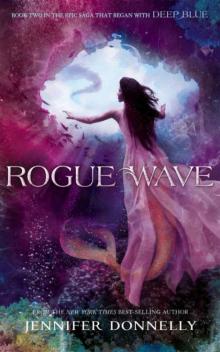 Rogue Wave
Rogue Wave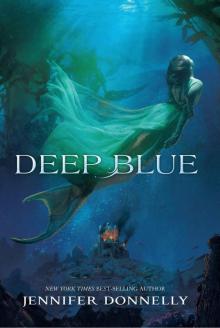 Waterfire Saga, Book One: Deep Blue (A Waterfire Saga Novel)
Waterfire Saga, Book One: Deep Blue (A Waterfire Saga Novel)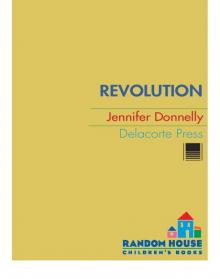 Revolution
Revolution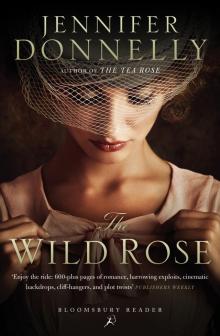 The Wild Rose
The Wild Rose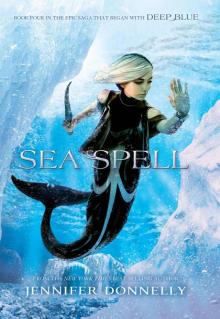 Waterfire Saga (4 Book Series)
Waterfire Saga (4 Book Series)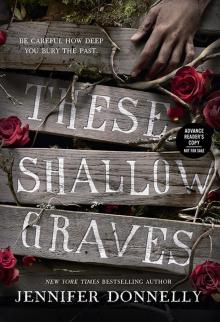 These Shallow Graves
These Shallow Graves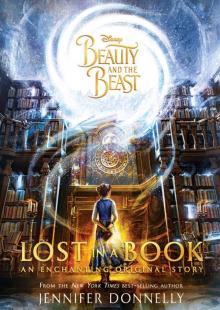 Beauty and the Beast: Lost in a Book
Beauty and the Beast: Lost in a Book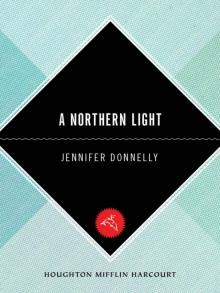 A Northern Light
A Northern Light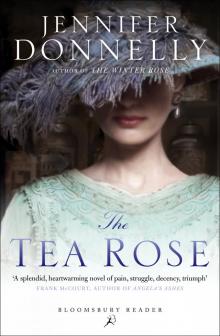 The Tea Rose
The Tea Rose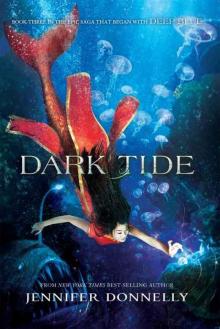 Waterfire Saga, Book Three: Dark Tide: A Deep Blue Novel
Waterfire Saga, Book Three: Dark Tide: A Deep Blue Novel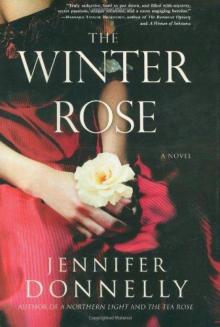 The Winter Rose
The Winter Rose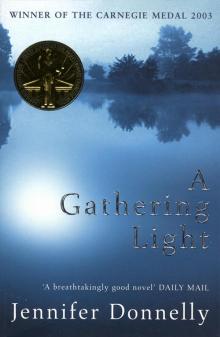 A Gathering Light
A Gathering Light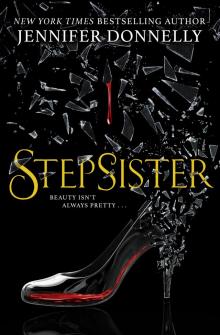 Stepsister
Stepsister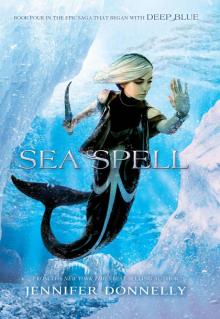 Waterfire Saga, Book Four: Sea Spell: Deep Blue Novel, A
Waterfire Saga, Book Four: Sea Spell: Deep Blue Novel, A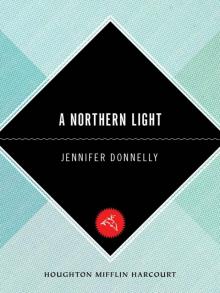 Northern Light
Northern Light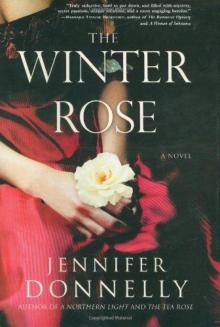 Winter Rose, The
Winter Rose, The